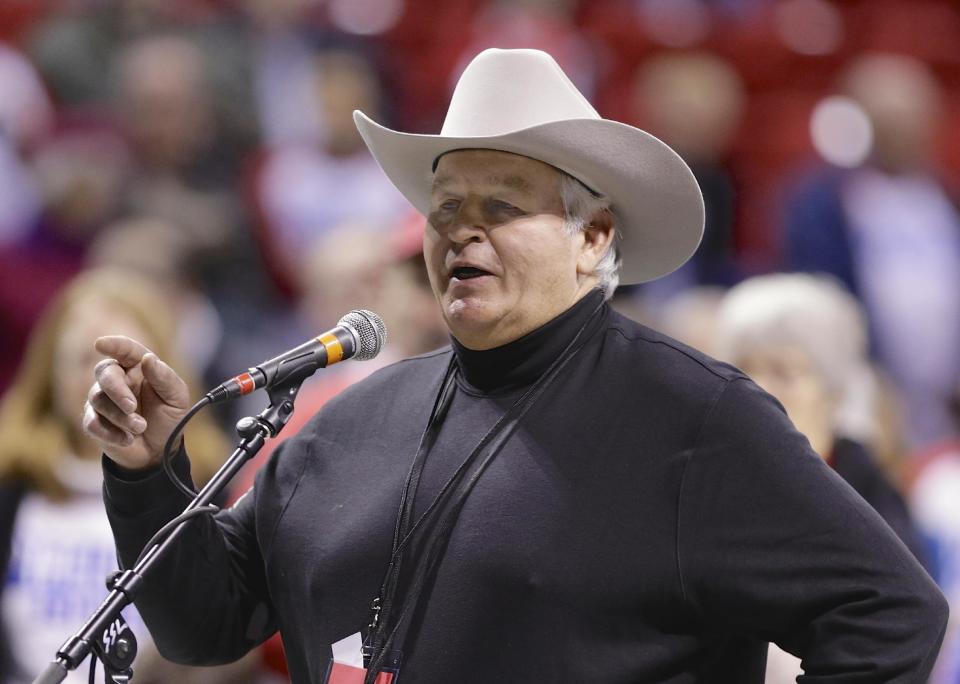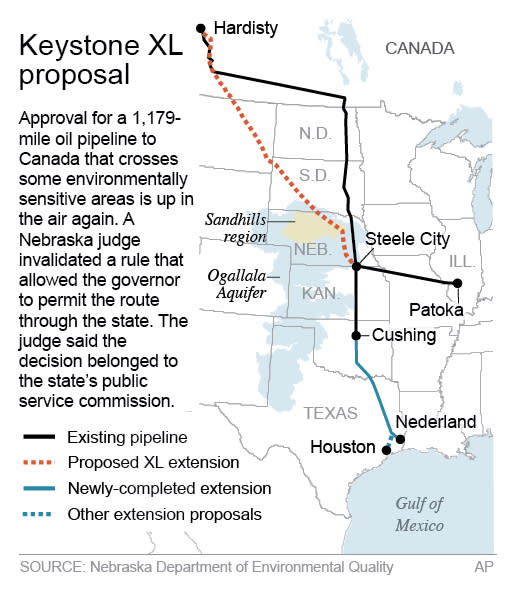Nebraska ruling mires Keystone XL in legal limbo
LINCOLN, Neb. (AP) — The Keystone XL pipeline route through Nebraska faces months of legal delays as an obscure state commission now tasked with reviewing the project said Thursday it won't budge until the state courts decide whether the path approved by Gov. Dave Heineman is invalid.
A spokesman for the Calgary-based company building the crude oil pipeline says this week's ruling by a Nebraska judge "is a solvable problem." And while he didn't believe the ongoing federal review process would be affected, the delays could push back President Barack Obama's decision on the entire Canada-to-Texas route until after November's midterm elections.
Judge Stephanie Stacy ruled Wednesday that the state's five-member Nebraska Public Service Commission should have decided the route. Because of a 2012 law, TransCanada had the choice of receiving final approval from the commission or from Republican Gov. Dave Heineman. The dual pathways effectively took away the commission's power, Stacy said.
Commissioners said Thursday they're waiting to see what happens next.
"We have intentionally stayed away from any meetings and any discussion related to the Keystone XL, for the purpose of staying impartial. Frankly, with this ruling, we're just waiting to see what the attorneys have to say," said Commissioner Gerald L. Vap, a Republican who represents western Nebraska.
Attorney General Jon Bruning filed notice Wednesday that he'll take the case to the Nebraska Court of Appeals — a process that could add months of uncertainty to the project. The case is expected to end up in the Nebraska Supreme Court, which generally issues opinions 6 to 8 weeks after hearing a case.
The Nebraska Public Service Commission regulates natural gas and power lines, buses, taxis, limos and grain warehouses. Commission members are elected to six-year terms in partisan elections. The current commission is composed of four Republicans and a Democrat.
Although elected by district, members serve in a role more akin to judges than politicians, reviewing evidence before making a decision, Commissioner Anne Boyle, a Democrat from Omaha, said Thursday. Companies that are unhappy with a commission ruling can file a lawsuit to challenge it, she said, so members are careful not to comment on projects that they might have to review.
"We cannot pre-judge a case," Boyle said. "Anything we say could be translated into something (that shows favor) one way or the other. And we're not doing that."
State law requires the commission to approve pipelines considered to be in the "public interest" — looking at its environmental impact, the tax revenue and jobs generated, as well as the views of local governments. But the TransCanada pipeline project never went in front of the commission because it wasn't clear the state had any role in regulating major oil pipelines.
The Keystone XL pipeline would carry 830,000 barrels of oil a day from Canada to Texas Gulf Coast refineries once completed. Heineman approved the 195-mile project leg through Nebraska — avoiding the environmentally sensitive Sandhills region — in January 2013, which gave TransCanada the power to use eminent domain on landowners who denied the company access to their property. Three landowners filed suit, saying the Public Service Commission should have made the decision.
The landowners' attorney, Dave Domina, said the commission's rulings are based on evidence and offer due-process safeguards, including the ability to appeal. Its roots are in a state railway commission created in the late 1800s to prevent governors from granting political favors to railroad companies.
TransCanada wasn't a party to the lawsuit, but spokesman Shawn Howard stressed that Stacy's decision focused on the law, not the pipeline's merits.
"TransCanada has dealt with many Keystone XL issues in the past and we are confident we can overcome this latest hurdle," Howard said.
Stacy's ruling could give the State Department and White House a reason to extend the long-delayed review process past the midterm elections in November, energy analyst Kevin Book said Thursday. The pipeline was first proposed in late 2008, but the Obama administration delayed a decision on the pipeline in January 2012, citing the "rushed and arbitrary deadline" imposed by congressional Republicans.
Book, managing director at ClearView Energy Partners in Washington, said he still thinks President Barack Obama is likely to eventually approve the project, but added, "Things always seem to take a bit longer on 'Keystone Standard Time.'"
Environmentalists have seized on the pipeline as a symbol of the fight against global warming, saying the pipeline would extend U.S. dependence on fossil fuels that warm the planet. Opponents also worry about oil spills that could seep into the Ogallala Aquifer that provides water to eight states in the central U.S.
Pipeline supporters — including lawmakers from both parties and many business and labor groups — say the project would create thousands of jobs and reduce the need for oil imports from Venezuela and other politically turbulent countries.
TransCanada could change the route to avoid Nebraska, but that would likely delay the project while the State Department reviews the new route.
__
Associated Press writer Matthew Daly contributed from Washington.



